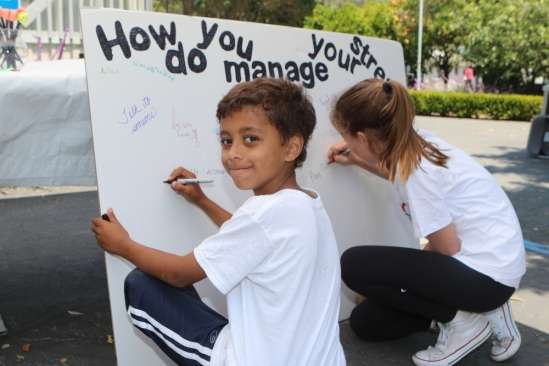Researchers study the effectiveness of an innovative program designed to help youth learn about mental health

Ann Lippincott knew nothing about mental illness when her daughter, just out of college, was diagnosed with schizoaffective disorder. Lippincott educated herself quickly, however, and has since devoted her time and energy to teaching others about mental illness, with the hope of reducing the stigma too often associated with it.
Lippincott, an emeritus professor of education at UC Santa Barbara's Gevirtz Graduate School of Education, worked on behalf of the Mental Wellness Center in Santa Barbara to develop Mental Health Matters, an innovative, interactive curriculum for sixth-graders that was introduced to Santa Barbara-area schools nine years ago. The series of five, one-hour lessons is integrated into the sixth-grade Language Arts curriculum.
Today, Mental Health Matters, a program of the Mental Wellness Center, is in place in 35 classrooms in schools in Goleta, Santa Barbara, Montecito and Buellton, helping 11- and 12-year-old children learn to recognize the signs and symptoms of six major mental illnesses: attention deficit hyperactivity disorder, anxiety and stress disorders, major depression, bipolar disorders, eating disorders and schizophrenia.
The goal is to increase the students' understanding of mental illness, reduce the associated stigma and share wellness practices.
But, does program actually work?
Until now, mental health advocates and teachers at the local schools thought—and hoped—it was making a difference, but they had only anecdotal evidence to that effect. Enter Hannah Weisman, a doctoral student in the Department of Counseling, Clinical and School Psychology at UCSB, and part of the Mental Health Matters teaching team. Weisman and her graduate advisor, Maryam Kia-Keating, an associate professor in the Department of Counseling, Clinical and School Psychology, designed a study to find out. The findings, which appear in the October issue of the Journal of School Health, suggest the program is reaching its goals.
"We would like to believe that by educating young people before stigma has reared its ugly head—knowing that stigma is the number one reason people do not get the help they need and deserve—our efforts are making the difference we were hoping they would make," said Lippincott.
According to Kia-Keating, the researchers saw an increase in the students' knowledge of mental illness and a decrease in the stigma associated with it. In open-ended questions, for example, students wrote comments such as, "I used to think that people with mental health disorders are the ones to blame for their disorder; now I know that it is not the person's fault and they have not done anything wrong," and, "I used to think mental health disorders are contagious; now I know they are not."
"I'm definitely a fan," Kia-Keating said of the Mental Health Matters program. "We were very excited to find such an innovative program that was embedded in the school curriculum and was addressing mental health issues, in particular how we reduce stigma, and how we start early."
According to the researchers, approximately 22 percent of children will develop a mental health disorder with severe impairment by the time they reach 18, and it's likely most adolescents will encounter a peer with a mental health disorder. "Mental health issues are part of life," Kia-Keating continued. "I think the more that we're able to talk about mental health in an open way, have kids be able to have their questions answered, and not have it be a topic that's hidden from them, is essential."
"The Mental Wellness Center is proud to partner with UCSB to evaluate the efficacy of our Mental Health Matters program," said Annmarie Cameron, the center's chief executive officer. "This study begins to support our belief that educating youth with mental health facts and anti-stigma messaging will improve their attitudes regarding self-care and peer acceptance, and overall wellness messaging increases self-regulation strategies."
The Mental Wellness Center is a Santa Barbara nonprofit organization dedicated to meeting the needs of individuals and families affected by mental illness, through support, education and direct services.
More information: Hannah L. Weisman et al. Mental Health Stigma Prevention: Pilot Testing a Novel, Language Arts Curriculum-Based Approach for Youth, Journal of School Health (2016). DOI: 10.1111/josh.12427













